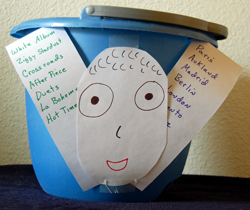Before You Die
Here, life has been busy in a good way. I’m working hard on what’s turning into quite a long piece for an anthology of stories set in S.M. Stirling’s “Change” alternate history. My story is set in and around the New Mexico malpais, west of Albuquerque, south of Grants and Acoma. Now that I’ve found my way into the story, the writing is moving along nicely. Good thing, since the due date is the end of March.

Bucket’s Lists
Promotional wheels are beginning to roll for Artemis Awakening. I’ll be coming out to California over the first weekend in June to sign at Mysterious Galaxy in San Diego (June 6) and Borderlands Books in San Francisco (June 7). I’ll also have at least three signings in Albuquerque. Others elsewhere are possible. See my newly revised website, http://www.janelindskold.com, for details and updates.
This past weekend, I was browsing some book catalogs and noticed a trend toward books telling you about things you shouldn’t miss out on before you die. The range was quite wide: places to visit, movies to see, songs (or entire albums) to listen to, foods to eat, pieces of art to see, various activities to try… Sometimes the number was modest as in “10 National Parks to See,” but more usually it was a dramatic 100 or even 1,000 items. Sometimes, instead of giving a number, the book presented a “bucket list” (as in “kick the bucket”). In most cases, the word “must” (or something similar) was included.
I have no idea where this trend originated. Certainly, when we hit the year 2000 there were any number of lists offering expert opinions as to what had been the best books or music or works of art or whatever of the last century or millennium or, even, in really ambitious cases, since the dawn of human civilization. However, these were presented as the opinions of a person or group, usually one that claimed some sort of expertise on the subject. These lists were presented, briefly argued about (especially regarding rankings or what was or was not included), and then, forgotten. As far as I can tell, very few of the people presenting these lists made any attempt to force their lists on anyone else. (An exception might be the use of “best books” lists to inform school curricula.)
However, implicit in these “before you die” lists is a sense of urgency. Whether the phrasing is “must do” or “try,” the implication is that, if you don’t follow these guidelines, your life will have been wasted and incomplete. For the last several days, I’ve been trying to figure out how I feel about this trend. Complicating the matter is an image I can’t get out of my head – that of a fellow actually trying to follow up on all these “must do” directives.
I see a person sitting on a sofa with a video game controller in his hand. (One book I came across was 1001 Video Games You Must Play Before You Die). In the other hand, he holds a novel that he glances at occasionally. A big screen television is playing a movie. (A window inset in the screen displays the video game.) He has earphones on and is listening to music. When we pull the image back, we can see that he is sitting in a recreational vehicle, speeding through Yellowstone or one of those “must see” places. An array of equipment intended for some of those “things you must try before you die” can be seen scattered around. Finally, long lists with a variety of big, red checkmarks are pinned to the walls.
Despite the chaos in the above image, I also find something positive about these lists. Certainly, there’s something admirable about trying to do something with one’s life, rather than just drifting through. I always found the phrase “Thank God It’s Friday” (shortened to TGIF) rather creepy. TGIF implied that life was restricted to a minor percentage of the week – Friday evening through sometime on Sunday, when work once again loomed its ugly head. Songs like “Everybody’s Working for the Weekend” reinforce the idea that we live to the fullest only a short period of time. This is also embraced in a lot of “rebel youth” music that implies that life is over when you hit that big 3-0.
In contrast to this attitude, these “must do” lists seem a whole lot more positive. Maybe you’re working a dead end job but if, while you’re doing it, you’re listening to a wide variety of music or an audio book, or seeking out a special food, or planning a trip that will expand your horizons, then you haven’t put your life on hold. Even something as simple as signing up for a “word a day” list (as several of my friends do) seems like a neat attempt to get the most out of every day. In this context, “must do” or “must try” becomes a way of living a vital, examined life – especially if you don’t just listen or play or see for no other reason than checking something off your list, but think about what you’re experiencing.
So, do these “must do” books make you feel as if you’re missing out on life or provide guideposts on how to live it more fully? Do you end up feeling stressed and overwhelmed because of everything you could (or should) be doing? Do you want someone else to provide a list, because they’ll have fresh ideas or approaches, or would you prefer to design a list on your own?





